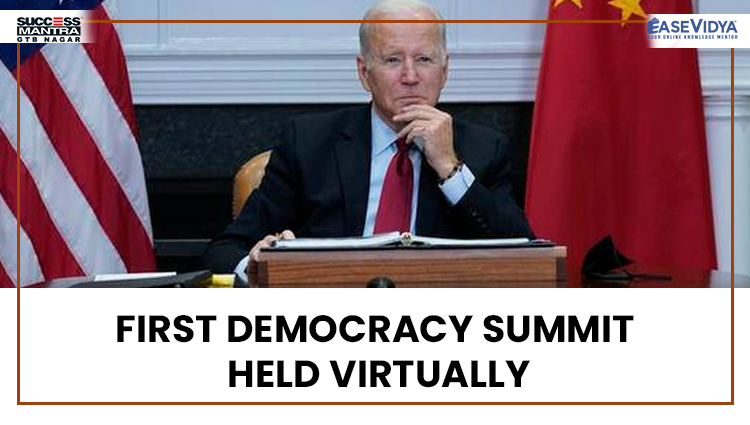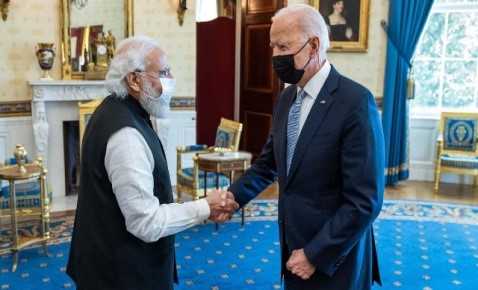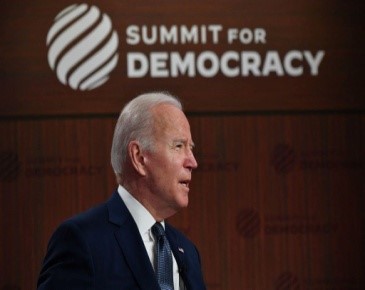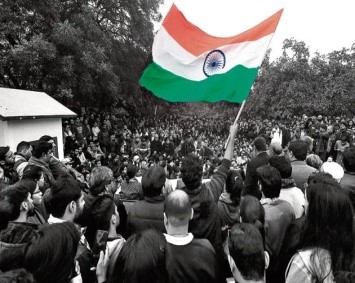
FIRST DEMOCRACY SUMMIT HELD VIRTUALLY
FIRST DEMOCRACY SUMMIT HELD VIRTUALLY
The President of the United States Joe Biden has invited more than 100 countries to a virtual summit on democracy to be held on December 9-10, 2021. The invite list of the democracy summit includes India and Taiwan but excludes China, a move which is bound to anger the country. The virtual democracy summit was a campaign pledge by the US President, who placed the struggle between the democracies and the autocratic governments at the heart of his foreign policy. The Summit for Democracy will be taking place ahead of an in-person meeting at its second edition in 2022. The main rivals of the United States- Russia and China- have been excluded from the list, however, the inclusion of Taiwan is guaranteed to further escalate the tensions between US and China. It is widely known that China resists any use of the word ‘Taiwan’ as it lends a sense of international legitimacy to the democratic self-ruled island, which China claims as part of its territory and has also vowed to seize one day. The final list leaves out Russia, while in the South Asia region Afghanistan, Bangladesh, Sri Lanka have been excluded.

Current Affairs Notes By Success Mantra Coaching Institute GTB Nagar Delhi CLICK HERE
WHO IS INVITED IN THE SUMMIT?
To a virtual summit on democracy, including the major western alliances, the US has invited India and Pakistan from the South Asia region. From East Asia, Japan is invited to the summit. Taiwan is invited to the virtual summit on democracy. A major diplomatic move that will further escalate the tensions between US and China. Among the Middle East countries, only Iraq and Israel have been invited to the summit on Democracy. Brazil is invited even though Jair Bolsonaro, Brazil’s far-right President has been criticized as having an authoritarian bent. He was also a firm supporter of Donald Trump. Poland has been invited to the summit despite the continuous tension with the EU over its human rights record. The Philippines is also invited. In Africa, South Africa, the Democratic Republic of Congo, Niger, and Nigeria are invited to the Biden Democracy Summit.
WHO IS NOT INVITED?
China and Russia, the principal rivals of the United States, are not invited to the Democracy Summit. Turkey is missing from the participant’s list. The country is also the US's NATO ally. Traditional Arab allies of the United States- Saudi Arabia, Egypt, Jordan, Qatar, and the United Arab Emirates, are not on the democracy summit invite list. As per the list posted on the US State Department website, Afghanistan, Bangladesh, and Sri Lanka are excluded from the summit. Hungary is not invited. The country is led by the hardline nationalist Prime Minister Viktor Orban.
KEY HIGHLIGHTS OF THE SUMMIT
It aims to show how open, rights-respecting societies can work together to effectively tackle the challenges of present time, such as the Covid-19 pandemic, the climate crisis, and inequality.
India’s Stand: Democracies should jointly deal with social media and crypto currencies, so that they are used to empower democracy, not to undermine it. India is the largest democracy in the world which has 2,500-year-old democratic traditions and proposes to share India's democratic experience through digital solutions. Referred to the civilisational tradition of democracy in India citing the ancient city states under the Licchavis and other people that flourished in India during the late Vedic and Buddhist period and continued to the early medieval period. Democracy has taken various shapes across the world and there is a need to work on the democratic practices and symptoms. It is needed to constantly improve the democratic practices and systems and to continuously enhance inclusion, transparency, human dignity, responsive grievance redressal and decentralization of power.

PRAVAHINI Current Affairs Notes By Success Mantra Coaching Institute GTB Nagar Delhi CLICK HERE
WHAT IS DEMOCRACY?
Democracy is a system of government in which the citizens exercise power directly or elect representatives from among themselves to form a governing body, such as a parliament. It is also referred to as “rule of the majority”. Here the power can’t be inherited. People elect their leaders. Representatives stand in an election and the citizens’ vote for their representative. The representative with the most number of votes gets the power.
Brief History: India is the world’s largest democracy. India became a democratic nation post its independence in the year 1947. Thereafter, the citizens of India were given the right to vote and elect their leaders.
INDIA'S ROLE IN STRENGTHENING DEMOCRACY
- Around the World: Capacity Building: Beyond demonstrating the Election Commission (EC)’s enviable record in conducting free and fair elections, India has given training to the thousands of electoral officials from Asia, Africa, and other regions of the world in election management and parliamentary affairs for several decades.
- Developmental Partnership Administration (DPA): India has created a Developmental Partnership Administration (DPA) within the Ministry of External Affairs (MEA) to offer critical development assistance projects for many developing and new democracies across geographies.
- Examples: The building of the Afghan Parliament, providing support to Myanmar for upgrading its administrative and judicial capabilities, amongst others.
- Funding to Democracy Watch Dogs: Together with the US, India was instrumental in the creation of the UN Democracy Fund (UNDEF) and the Community of Democracies to support democracy at international levels. Incidentally, India is one of the largest contributors to UNDEF that supports 66 NGO-led projects in South Asia.
- United Nations Democracy Caucus: India also helped to form the United Nations Democracy Caucus, the only body within the UN system to convene democratic states based on shared values.

In India:
- Breaking Racial Discrimination: India has given representation to a Dalit woman to rise to the highest office (as Chief Minister).
- Right to Information Act, 2005: The act, a totally civil society driven grassroot movement has truly democratized information spaces for ordinary citizens.
- Democratic Decentralization: Twin constitutional amendments (73rd and 74th) in 1992 to create third-tier governments (rural and urban local bodies), has taken deep ground in the last three decades. With 3 million representatives at various levels (Gram Sabha, Panchayat Samiti, and Zilla Parishad), this is by far the largest democratic exercise anywhere in the world.
Concerns Related to Democracy:
Democracies across the world—rich and established, developing and newly established ones—are grappling with serious crises on many key parameters. According to the reports of leading democracy watch dogs, democracy is witnessing an alarming decline. According to Democracy Index 2020, as low as 9% of the world population live in a “full” democracy. The recent military coups in Myanmar, Tunisia, and Sudan are testimonies to the steady rise of anti-democratic forces and the failure of the global democracy collective to do anything meaningful to stem the rot. Rising threats stemming from the steady rise of authoritarian powers, particularly China is a major concern. At a time when the West, particularly the US and rich European countries, have considerably ceded their global commitment to democratic values, China has set its eyes on re-defining global human rights and democracy norms.
Examples: China has marshaled the military and diplomatic means to threaten Taiwan, forced territorial claims in the disputed South China Sea, thrown millions of Uyghur Muslims in internment camps, curbed political freedoms in Hong Kong, and launched influence operations across many geographies.
India’s: The Freedom House 2021 report put India as only “partly free”, the V-Dem report went a step ahead to call it an “electoral autocracy”. According to the Global State of Democracy 2021 report, India was amongst the 10 most backsliding democracies—a more severe and deliberate kind of democratic erosion
Three principal themes at democracy summit
While announcing the Democracy Summit back in August 2021, the US had said that the meeting on democracy will stimulate the initiatives and commitments across three principal themes:
- Defending against authoritarianism
- Fighting Corruption
- Promoting Respect for Human Rights
A Virtual Summit on Democracy is being organized by the United States as democracy has suffered major setbacks in the nations where the country had placed great hopes. Myanmar and Sudan have experienced military coups. Taliban has taken over Afghanistan after the withdrawal of US troops and Ethiopia is in the midst of a conflict that can lead to its implosion.
TEST YOURSELF
Q.1 Which of the following has invited India in the summit on democracy to be held in December?
- Japan's PM Fumio Kishida
- Canada's PM Justin Trudeau
- US President Joe Biden: ANSWER
- None of the following
Q.2 Which of the following who are also the main rivals of the United States of America are invited to the Democracy Summit to be held recently?
- China & Russia: ANSWER
- Turkey & Saudi Arabia
- Syria & North Korea
- None of the following
Q.3 There are three principles on which the democracy summit is based. Which of the following is not one of them?
- Defending against authoritarianism
- Fighting Corruption
- Promoting Respect for Human Rights
- I & II follows
- II & III follows
- I, II & III follows
- None of the following: ANSWER
Q.4 The United States of America as part of which of the following legislation, required to assist Taiwan if coerced or attacked by China?
- Taiwan Relations Act, 1979: ANSWER
- Taiwan's Security Act, 1981
- Taiwan Sovereign state Act, 1979
- None of the following
Q.5 Consider the given statements & state which of the following is/are correct in the reference to the Group of Seven (G-7) nations?
- It is an intergovernmental organisation that was formed in 1995 & meets annually to discuss issues of common interest like global economic governance, international security and energy policy.
- The Group of Seven (G-7) countries includes the United Kingdom, China, India, Germany, Italy, Japan and the US.
- Only I follows
- Only II follows
- Both I & II follows
- None of the above: ANSWER













0 Comment